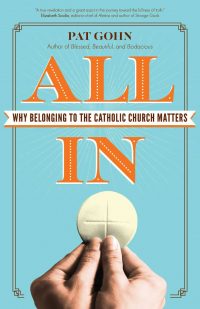 “All In: Why Belonging to the Catholic Church Matters”
“All In: Why Belonging to the Catholic Church Matters”
by Pat Gohn.
Ave Maria Press (Notre Dame, Indiana, 2017).
181 pp., $13.95.
“All In” begins with author Pat Gohn describing how her commitment to the Catholic Church is like her gradual appreciation of her husband’s enthusiasm for tinkering with old MGBs. Her husband’s passion for cars became hers because she learned to love what he loves.
To Gohn, the Catholic Church is “a stronghold of reliable truth, is sure footing on solid ground in a troubled world.” The Catholic Church helps her to grow and sustain her relationship to God, connects her with other people and is a “conduit of grace, forgiveness, healing, wisdom and renewal.”
This book came out of a period of disillusionment Gohn had when the sex abuse scandal in the Boston area became national news. While she never left the church, she felt the need to review and justify the core beliefs of the Catholic Church.
The chapters of the book address the fatherhood of God, the motherhood of the church and our divine friend, Jesus Christ. Twenty years ago, Gohn had a bout with breast cancer. The experience of being seriously ill made the concept of heaven very real for her. But heaven is not overcrowded, she says, as many are still in purgatory cleansing their souls.
[hotblock]
In a chapter on the motherhood of the church, Gohn compares the great rounded arms of the plaza in front of St. Peter’s in Rome to the loving arms of a mother. As lovely as that image is, Gohn is well aware that many feel betrayed by their mother church. But she blames individuals in the church for the blemishing of the church in the sex abuse scandal, not the church itself.
She is convinced that grace “gives us to power to forgive and offer a kinder look toward our offenders who have lost their way.” One wonders what the victims of clergy sex abuse might feel about this rather blithe assessment of the wrongdoers in the church. Gohn doesn’t seem to understand that the structure of a church and the education of its priests are among the primary reasons that sex abuse flourished. Yes, individuals are responsible for their actions, but so are institutions that protect those they know are doing wrong.
Reading “All In” is like time travel to the 1950s as it describes a triumphant church that existed before it was radically altered by the reforms of the Second Vatican Council, an event that is almost never mentioned in “All In.”
This book will reassure conservative Catholics, but it is doubtful it will change the minds of Catholics who believe in a church that embraces the signs of the times. There are many Catholics who don’t crave certainty and timeless doctrine. Instead they seek an honest, challenging church that helps the poor, works toward a better ecofriendly world and fights for the oppressed.
***
Yearley is currently seeking a doctorate in ministry at St. Mary’s Seminary and University and Ashland Theological Seminary.
PREVIOUS: The power of TV, the fear of consolidation: two ends of the same stick
NEXT: Money, drugs, sex and Tom Cruise: It certainly is ‘American Made’



Share this story